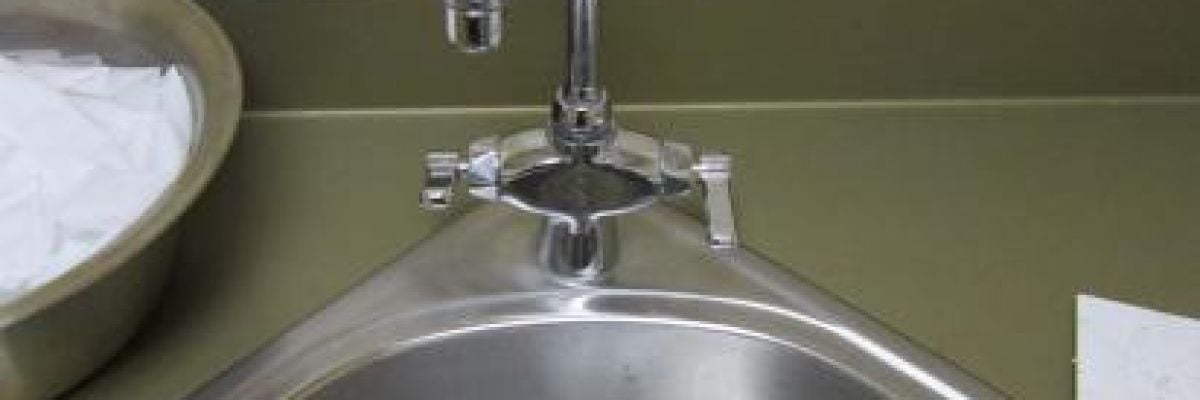
When the bread and wine become the Body and Blood of our Lord Jesus Christ at Mass, the change is permanent. It remains so long as the appearances of bread and wine do.
This has implications for how we treat the consecrated elements after Mass is over. Hosts that remain are stored in a Tabernacle, but what about the Precious Blood?
It cannot normally be reserved (the only exception being when it will be taken to the sick, and then special precautions have to be taken to keep it from spilling).
If there is a quantity of the Precious Blood left and it cannot be reserved, what are you supposed to do?
Pouring the Precious Blood into a Sacrarium?
Some have suggested pouring it out–not out on the ground or down an ordinary drain but down a special kind of sink known as a sacrarium.
Sacraria are typically found in the sacristy of a church, and they differ from an ordinary sink in a crucial respect: Instead of draining into the local sewer system, they drain down into the earth.
Sacraria are used for a variety of purposes, including these:
- To dispose of ashes from objects that have been blessed and then destroyed by fire
- To dispose of the water that has been used to wash the altar linens
- To dispose of water that has been used to dissolve small particles of the host
- To dispose of water that has been used to clean up places where the Precious Blood has spilled
Except for the first example, which deals with the ashes of former blessed objects, the other examples cited deal with water that is known to have or may have come into contact with the consecrated elements (since small particles of the host might be on the altar linens).
Given that, can you use the sacrarium to dispose of the Precious Blood itself? After all, it’s not like you’re pouring it into the sewer. You would be pouring it into something specially intended to deal with the remains of sacred things, right? So can you do this?
No. You can’t.
Throwing Away the Consecrated Species
It’s one thing to pour water into the sacrarium, even if that water has been used to dissolve the consecrated species. In that case, the appearances of bread and wine no longer remain, and so the Real Presence does not remain, either. It is another thing entirely to use it to throw away the consecrated species themselves.
According to the Code of Canon Law,
Canon 1367 A person who throws away the consecrated species or who takes them or retains them for a sacrilegious purpose incurs an automatic (latae sententiae) excommunication reserved to the Apostolic See; if a cleric, he can be punished with another penalty including dismissal from the clerical state.
This offense is one of those graviora delicta (graver offenses) that is reserved to the Congregation for the Doctrine of the Faith, as noted in the instruction Redemptoinis Sacramentum, which provides:
[172.] Graviora delicta against the sanctity of the Most August Sacrifice and Sacrament of the Eucharist are to be handled in accordance with the ‘Norms concerning graviora delicta reserved to the Congregation for the Doctrine of the Faith’, namely:
a) taking away or retaining the consecrated species for sacrilegious ends, or the throwing them away;
Pouring the Precious Blood into a sacrarium counts as throwing away the consecrated species, and so it cannot be done.
It Is Explicitly Forbidden
The fact that pouring the Precious Blood even into a sacrarium is not permitted is made explicit in Remptionis Sacramentum, which provides:
[107.] In accordance with what is laid down by the canons, “one who throws away the consecrated species or takes them away or keeps them for a sacrilegious purpose, incurs a latae sententiae [automatic] excommunication reserved to the Apostolic See; a cleric, moreover, may be punished by another penalty, not excluding dismissal from the clerical state”.
To be regarded as pertaining to this case is any action that is voluntarily and gravely disrespectful of the sacred species.
Anyone, therefore, who acts contrary to these norms, for example casting the sacred species into the sacrarium or in an unworthy place or on the ground, incurs the penalties laid down.
The good news, for anyone who has done this innocently not knowing that they shouldn’t, is that the excommunication does not apply to them (CIC 1323, no. 2).
But the rule remains: No pouring the Precious Blood down a sacrarium.
What You Are Supposed to Do
The actual answer is that any remaining amount of the Precious Blood should be consumed. Section 107 of Redemptionis Sacramentum continues:
Furthermore all will remember that once the distribution of Holy Communion during the celebration of Mass has been completed, the prescriptions of the Roman Missal are to be observed, and in particular, whatever may remain of the Blood of Christ must be entirely and immediately consumed by the Priest or by another minister, according to the norms, while the consecrated hosts that are left are to be consumed by the Priest at the altar or carried to the place for the reservation of the Eucharist.
Want to learn more?



